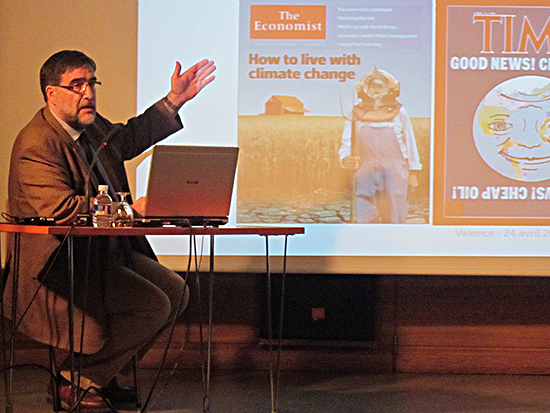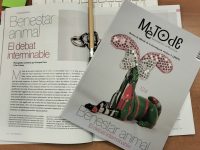
 © J. V. Bernabeu Pardo |
«The use of plants like miscanthus wouldn’t add to the concentration of carbon dioxide in the atmosphere, since the CO2 the plant emits when combusting is the same quantity it absorbes while growing» |
|
|
Nowadays there are almost seven billions of inhabitants on Earth. In forty years, we will be nine billions, according to the latest calculations of the UN. With this forecasting, it is worthwhile asking to ourselves if the planet is capable of standing this population growth, taking into account that our way of life is based on high levels of energy consumption. Up to what point can we go on living at this rate? The scientist Paul Colonna, from the Collège de France, visited l’Institut Français in Valencia on the 24th of April in order to give a conference about biofuels, the source of enrergy of the future developing in the present. The agronomical engineer, with a PhD. from the University of Paris VI in Physical-chemistry, is a delegate of INRA (Institut National de Rechercher Agraire) for Sustainable Development. There, Paul Colonna is head of the Carnot Institute for Bioenergy, Biomolecules and Biomaterials from renewable carbon. In his conference, the researcher explained the latest advances in the obtaining of fuels from renewable carbon, by using the bio-mass or herbs like miscanthus, a vegetable species, which comes from Japan, that is revolutionizing the energy panorama in France in the latest years. According to Paul Colonna, the use of biological carbon is the best option to subsitute the use of fossil fuels, too damaging for the atmosphere. While fuel combustion comes back to the atmosphere as CO2 which, for thousands of years, had sedimented in the subsoil (fact that, on the other side, allowed life on Earth); the use of plants like miscanthus wouldn’t add to the concentration of carbon dioxide in the atmosphere, since the CO2 the plant emits when combusting is the same quantity it absorbes while growing. The French researcher emphasised that the problem of climatic change requires “urgent” measures oriented towards changing the current model of development. It is necesssary to act quickly, otherwise its consequences could be irriversible — the rise in temperature will make the population of the countries of the south to emmigrate to the north, stated the scientist. Because of this, optimization of natural resources will become essential. |
|
|
 © J. V. Bernabeu Pardo |
«In its headquarters in Alicante, BFS concentrates a large quantity of microalgae which reproduce thanks to the CO2 emitted by a nearby cement factory. Every day, a part of this liquid is extracted and filtered in order to obtain bio-mass» | |
|
Some countries are already “getting ready” for these challenges, like the UK or Germany, where local initiatives are being taken to term in order to reorientate economic production towards a bio-economy. This system is based on the exploitation of the bio-mass and biotechnology to produce economic growth without increasing the ecological impact, by means of business relocation and the promotion of bio/agro-industry. Studies such those carried out by institutions like INRA are, therefore, fundamental. Multinational companies like BP or BFS are already looking for the way to obtain biofuel on a large scale in order to substitute the use of fossilised carbon. In Alicante, por instance, BFS has made an advance in later years on the use of microalgae, an organism with a power of carbon syntehsis ten times stronger than that of any other plant on earth. In its headquarters in Alicante, BFS concentrates a large quantity of microalgae which reproduce thanks to the CO2 emitted by a nearby cement factory. Every day, a part of this liquid is extracted and filtered in order to obtain bio-mass. On the other hand, BP donated 500 million dollars to Berkeley University (California) in 2007 so that they create a bio-mass transformation biomolecule. This is the other field to which Paul Colonna referred in his speech, that of the conception of ethanol molecules from directed mutagenesis of enzymes from wild species. «We need to take a holistic view of the situation» concluded Paul Colonna «in which all components are taken into account in order to be able to realise that the operation of the system we have created is not unlimited». José Vicente Bernabeu Pardo. Student of Journalism at the University of Valencia. |





